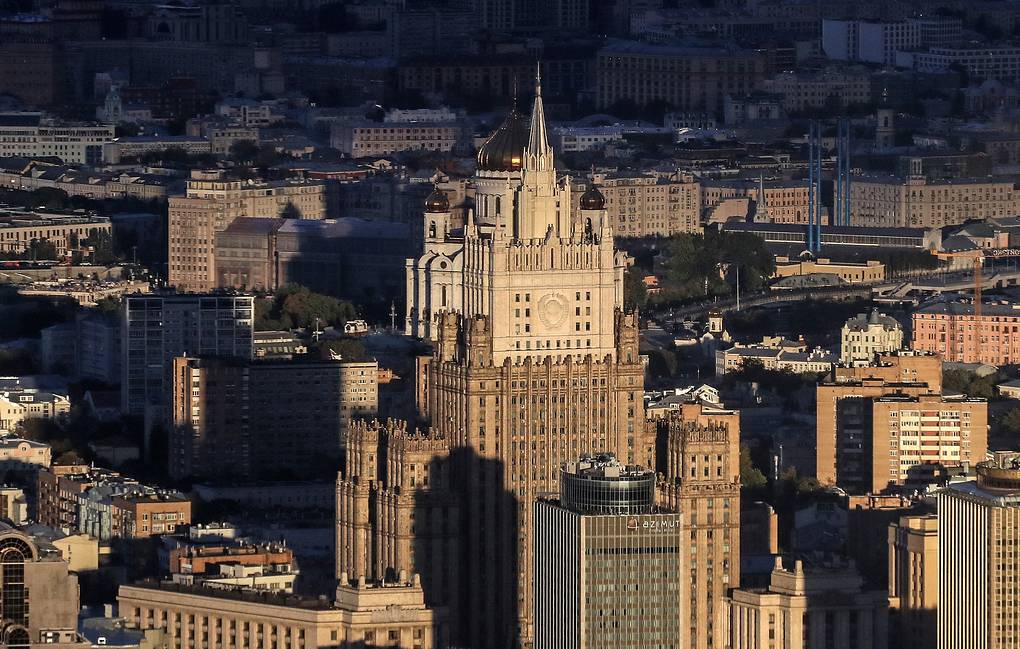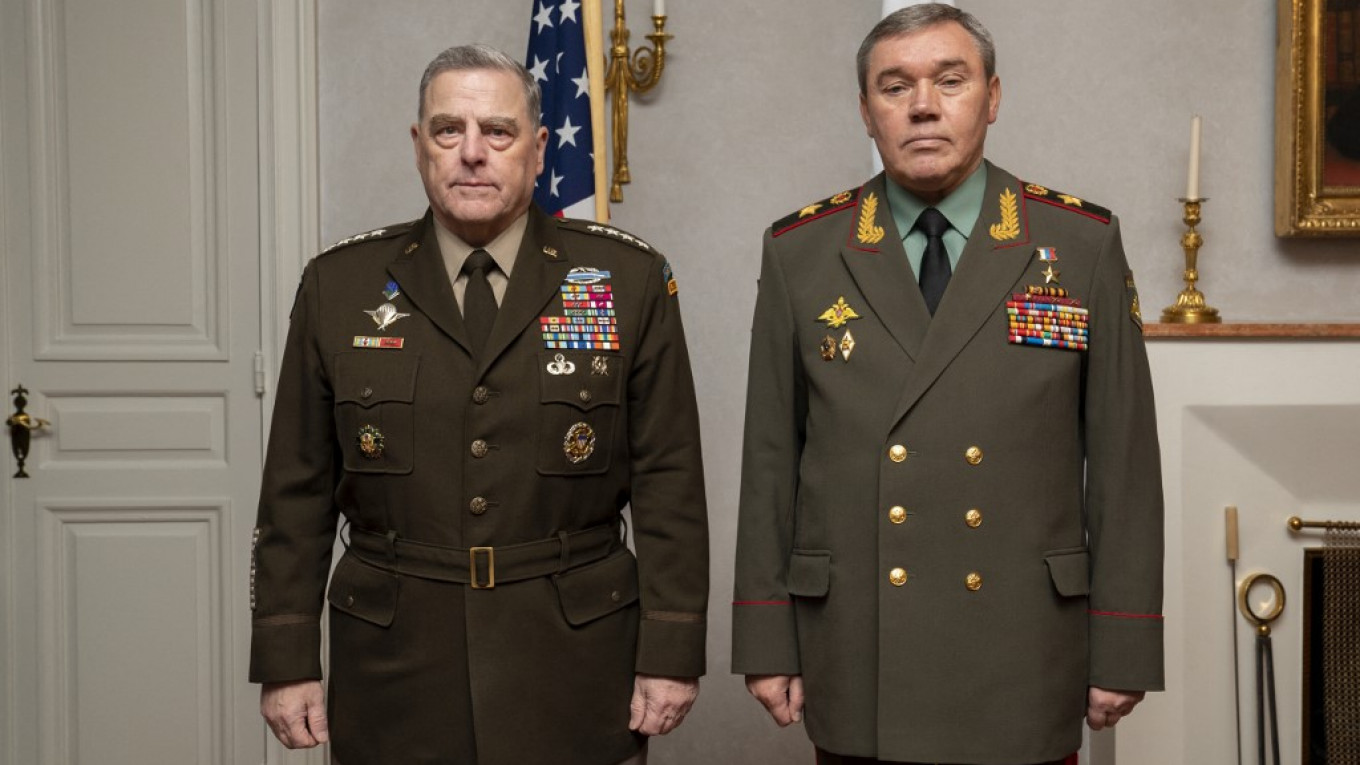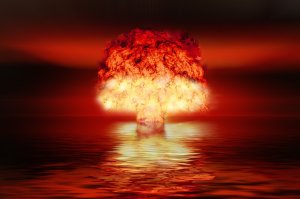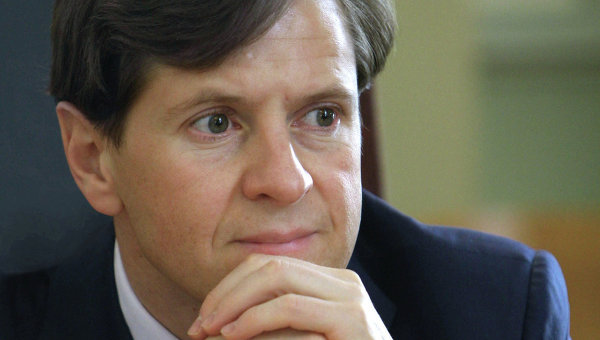
Published 21-03-2013, 13:06
 Russia and the United
Kingdom are headed for yet another spat following reports on 1 March of
London’s decision to grant political asylum to the former President of the Bank
of Moscow, Andrey Borodin. Resident in the UK since April 2011 and on the
INTERPOL Red Notice list since November 2011, Borodin is sought by the Russian
authorities on suspicion of fraud to the tune of US$420 million. His bank
accounts in Switzerland, Belgium and Luxembourg have all been frozen.
Russia and the United
Kingdom are headed for yet another spat following reports on 1 March of
London’s decision to grant political asylum to the former President of the Bank
of Moscow, Andrey Borodin. Resident in the UK since April 2011 and on the
INTERPOL Red Notice list since November 2011, Borodin is sought by the Russian
authorities on suspicion of fraud to the tune of US$420 million. His bank
accounts in Switzerland, Belgium and Luxembourg have all been frozen. Mr Borodin denies the charges brought against him and claims he is being persecuted for political reasons. He also claims that alleged irregularities at the Bank of Moscow which were discovered after its takeover by state-controlled VTB in February 2011 – and which necessitated a state bailout totalling US$14 billion – are to be attributed to problems at VTB itself and that the bailout provided an opportunity for assets to be siphoned off. In his version of the story, he fell into disgrace because he called for an investigation of the circumstances surrounding the bailout.
Borodin has also claimed in an interview with the Vedomosti newspaper that the chief orchestrator of the campaign against him is Dmitry Medvedev, who was President of Russia at the time of the bailout of the Bank of Moscow and is now Prime Minister. He alleges that he was ousted from the Bank of Moscow in what he dubbed a "corporate raid”. The implication is that Borodin may have crossed Medvedev because of his long-standing association with former Mayor of Moscow Yury Luzhkov (and Luzhkov’s billionaire wife, Yelena Baturina), whom Medvedev sacked in 2010 amid allegations of corruption.
Andrey Borodin thus joins the group of Russian oligarchs who have elected to go into exile rather than face charges in Russia; these include Boris Berezovsky, Vladimir Gusinsky, Leonid Nevzlin (an associate of Mikhail Khodorkovsky) and Yevgeny Chichvarkin. Details vary, but the common thread is alleged criminal misconduct in Russia and the accused claiming political motives for the charges brought against them.
The most outspoken members of this group are now gathered in the UK. Boris Berezovsky has launched from London repeated PR campaigns against President Vladimir Putin’s regime since its inception in 2000. Berezovsky, incidentally, claims to number among the friends of the late Alexander Litvinenko, who died in the UK capital in 2006 under suspicious circumstances. The Litvinenko case remains a source of major friction between Russia and the UK, with Moscow refusing to extradite the alleged suspect in the killing of Litvinenko.
The UK is also the home of choice of former US citizen William Browder, the chief architect of the Magnitsky Act recently passed by the US Congress, against whom the Russian authorities have just levelled fresh charges of financial misconduct. For its part, London is highly unlikely to cooperate with Moscow by extraditing Browder.
It could be argued that given Russia’s sweeping and often chaotic transformation, the clash between the new oligarchy and the state – and often, no doubt, the "state mafia” – was unavoidable. Thus it is hardly surprising that individuals who happened to have fallen foul of the state would invoke "politically motivated persecution” as their first line of defence. What is surprising, though, is that Russia and the West – and, in particular, the UK – have allowed cases such as those of Borodin to damage their mutual relations. It seems that instead of advancing their common interests in the fight against criminality, Russia and the West are sliding ever deeper into a stand-off from which only the criminals can benefit.
Questions:
- •To what extent could cooperation in the solving of alleged financial crimes become a factor in overcoming the new Cold War?
- •What prevents both sides from opting for this more constructive approach?
 The topic for the Discussion Panel is provided by Vlad Sobell,
The topic for the Discussion Panel is provided by Vlad Sobell, Editor, Expert Discussion Panel
Professor, New York University, Prague
Editor, Consensus East-West Europe
Expert Panel Contributions
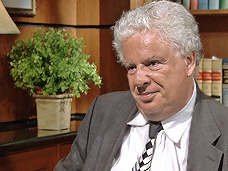 Martin Sieff
Martin SieffChief Global Analyst, the Globalist
Britain and Russia Forget They’re Friends
For 400 years, the most reliable continental ally England, and then Britain, has consistently been – Russia. Nobody in the British media or policymakers bothers to remember this now, but the pattern has been amazingly consistent: Long periods of time of rivalry that almost always remained peripheral, such as the Great Game rivalry in Central Asia in the late 19th and early 20th century, or the four and a half decades of the Cold War. But in every major conflict of that period, England/Britain and Russia found themselves on the same side. Only in the Crimean War did they stumble into a direct war, and it proved to be a needless disaster for both sides.
In the 20th century, Britain and Russia or the Soviet Union, to the surprise, even amazement, of many people in both countries, found themselves on the same side in both world wars to survive against Imperial and then Nazi Germany.
In all of these major conflicts, the financiers of the City of London recognized the underlying issue of survival and supported the repeated alliances with Russia.
However, since the days of Prime Minister Tony Blair, Britain has drifted into a policy of welcoming Russian oligarchs and being a welcome home for the billions of dollars, pounds or rubles in flight capital they brought with them. This has not made Britain popular in Russia. The latest expression of this growing conflict is the controversy over Andrey Borodin.
Ironically, all this has been going while one of Britain’s biggest and most important corporations, British Petroleum has been doing big business in Russia through its TNK-BP joint venture with Russian partners. BP is now closing a sale of its share in the company to Rosneft, in return for which the British oil giant will get a 20 percent equity stake and a board seat.
Analysts say this giant deal will be a major boon for BP. It will boost its opportunities to drill for enormous reserves in the Russian Arctic. And it will generate the huge sums in cash the company urgently needs to pay off its many claimants for damages in the United States following the Deepwater Horizon explosion and oil spill disaster in the Gulf of Mexico in 2010
The new row over Andrey Borodin, therefore, illustrates major conflicts in Britain’s business and diplomatic dealings with Russia.
For hundreds of years, Britain has benefited from Russia’s friendship against major threats to both countries. But today, the undoubted huge benefits of having hundreds of billions of dollars in Russian oligarchs’ flight capital based in London conflicts with BP’s massive and continuing business partnership with Russian oil majors.
What Britain and Russia really need to do is to negotiate a legal framework with Russia in which criminal cases and the pursuit of suspects in both countries can be resolved. The two nations still offer each other far too much allow their fundamental relationship to needlessly deteriorate because of squabbles over criminal cases.
Edward Lozansky
President American University in Moscow
Professor of World Politics, Moscow State University
What Price a UK Passport?
According to British Foreign Secretary William Hague, there have been many positive developments in UK-Russia relations since he assumed the post in 2010. "The visits to Moscow by the prime minister in 2011, and to London by President Putin last year, demonstrate the strengthening of political contacts at the highest level," he said. He also stated that Russia and the UK, as G20 and G8 hosts respectively, were bound to collaborate on matters of bilateral trade, innovation, science and higher education.
All very laudable, I am sure. But before we start applauding Mr Hague for these most welcome statements it would be interesting to know if he had any say in the recent decision to grant political asylum to Mr Andrei Borodin, former head of the Bank of Moscow, and other Russian "dissidents" who come to the UK to escape alleged political persecution in their homeland.
These days, the individuals granted asylum in Britain in no way fit the image of persecuted dissidents or refugees as we used to know them. In the old days Soviet dissidents fled their native country carrying a couple of suitcases packed with books and old clothes. Not anymore. Now they land in London with millions and often billions of dollars stashed in foreign banks. They can thus easily afford the most expensive real estate as well as the best lawyers and PR experts who will help them to concoct their stories of horrible persecution at the hands of Putin's KGB machine. Such "persecution” definitely qualifies them for political asylum – it is routinely granted practically without exception. There is also the following interesting pattern: the more money they bring to their asylum, the easier it is for them to get political refugee status.
Mr Borodin recently bought a Henley-on-Thames residence, the 300-year-old Park Place, for a reported £140 million, even though a portion of his billion-dollar fortune remains frozen in Switzerland. Have you ever heard of political dissidents with £140 million-homes and Swiss accounts of that size? It is hard to guess how much he paid to his lawyers from BCL Burton Copeland, but it looks like it was worth it. Money talks even in the country that regards itself as a bastion of the rule of law. Ironically, even the Financial Times, which never misses a chance to throw a rock at the Kremlin's windows, had to admit, in a story replete with Kremlin bashing, that regulators and independent auditors from the respected Deloitte & Touche firm found that "actions of the former Bank of Moscow management caused significant losses within the bank."
The UK political establishment simply ignores those highly regarded auditors' opinions as well as those of the Swiss public prosecutors who ordered the freezing of Borodin's accounts. From now on Borodin can safely posture as yet another of Putin's victims deserving protection by the British state.
The whole shebang reminds one of a similarly cynical behavior of the British government in the past. A few years ago Moscow accused a member of the British Embassy of using an electronics-stuffed rock to transmit messages to certain recruited Russian agents. The accusations were met with uproarious laughter at the awkwardness of these charges. But the laughter died down when the guy who actually was running this spy operation confirmed that Britain was indeed behind a plot to spy on Russians with a device hidden in a fake plastic rock. It was Jonathan Powell, former chief of staff to Prime Minister Tony Blair, who admitted in a BBC documentary that allegations made by the Russians in 2006 – dismissed at the time with a shrug – were in fact true.
Have we heard any apologies from the media from any of those who were then laughing so hard? Not a word. Dead silence. Best forgotten.
According to one of the commentators on an FT forum, Borodin and the likes of Borodin should not be allowed to "buy” UK citizenship. This is a privilege that should not be sold. Certainly not to individuals who miraculously become fabulously rich even without a plausible cover story.
Jan Cleave
Analyst, Russia/FSU research
Trusted Sources, London-based investment research company
The UK has long been the home of choice of the world’s wealthy and their families. Apart from its reputation for legal fairness and its long tradition of offering shelter to political and religious refugees, the obvious attractions include the country’s political stability, its highly developed real estate market and not least the quality of private education offered in the global lingua franca.
When Putin became President in 2000, relations between Russia and the UK were put on a surprisingly cordial footing: then Prime Minister Tony Blair and his wife paid a private visit to St Petersburg in March of that year, just ahead of the elections that brought Putin to power. But those relations very quickly soured against the background of the invasion of Iraq (in which the UK played a leading role and which Russia opposed). Increasingly, the UK authorities and media criticized Putin for his alleged backsliding on democracy and for what they dubbed authoritarianism. A not insignificant role in this unfortunate development was played by the very vocal Boris Berezovsky, who opted to reside in London in 2000 and was granted political asylum three years later. But one of the main reasons for the deterioration in Russia-Britain relations was the death in 2006 of Alexander Litvinenko: in vain British investigators sought the extradition of Andrey Lugovoi, their chief suspect in the alleged killing of Litvinenko.
There were no top-level official contacts between the two countries from June 2007 (when Blair briefly met with Putin at the G8 summit) to September 2011, when current Prime Minister David Cameron visited Moscow.
Today the UK (along with its close ally, the US) remains one of the main Western critics of the Russian leadership. The new wave of wealthy "political refugees” from Russia has taken advantage of this situation, and this, in itself, has only made Russia-UK relations even worse.
If the reports of Borodin’s being granted political asylum in the UK are confirmed – and it should be noted that the British government has not yet confirmed them (it refuses to comment on individual cases) – this would be the most contentious UK political asylum decision ever taken for a Russian oligarch. Anyone knowledgeable about Russian business would know that the only political background to Borodin’s plight was the move to clean up Moscow City Hall post-Luzhkov: while divesting the City's controlling stake in the Bank meant that the new owners would want to replace the management (including Borodin as CEO) – this is not exactly political.
Over the past decade or so the Russian government has become accustomed to the UK taking in individuals from Russia under this or the other pretext. So it will not be surprised if Borodin has been granted political asylum – in fact, it will not have expected anything else. For that reason the impact on already poor bilateral relations will be marginal only.
Anatoly Karlin
Da Russophile
All this assumes that the UK is not actually interested in solving financial crimes committed by foreigners. London has a reputation as a "safe sanctuary" for shady people of means from the ex-USSR and other less-developed places, and I think it's loath to lose it – as it would by extraditing the likes of Borodin – in return for the chance of improving its relations with Russia.
In general, I think we should treat the idea that Western countries give out political asylum out of genuine humaneness with skepticism. See the Dutch refusal to give Alexander Dolmatov, wanted in Russia in connection with the May 6th riots, political asylum. Was it because of their respect for Russian judicial sovereignty? Or did it have something to do with his work at military factory - and possibly, his preference for suicide over spilling military secrets?
In short, it's a very cynical game they play. London calls Russia a "mafia state" while sheltering those very mafiosi in Mayfair. The Europeans lecture Moscow about rule of law, but then see it fit to grab 7-10% of the value of all deposits in Cypriot (where many Russians, far from all of whom are tax evaders, bank).
From Russia's perspective, we have to note that concessions and a pacifistic attitude have never brought much in the way of benefits from the West. For instance, Ukraine has allowed in Europeans visa-free for years now, but it is Russia – which insists on mutual reciprocity in relations – that is far more advanced in negotiations to institute visa-free travel with the EU.
As North Korean diplomat Jon Yong Ryong said, "a high-handed policy should be countered by a tough-fist policy." In other words, nobody will respect you if you don't first respect yourself. Instead of piteously whining about British "hypocrisy" and "double standards" and other moralistic claptrap, Russia should take a cue from the DPRK and retaliate in kind. In this particular case, it could make it clear that big-time British financial fraudsters and tax evaders (no need to bother with little fishes) are welcome in Moscow provided they make the requisite "investments." Not only will it feel good to give the "doctor" some of his own medicine, but it actually stands a chance of incentivizing future British cooperation on financial crimes by hitting their Exchequer. As an added bonus, it also wouldn't hurt Moscow's quest to become a global financial center.
It's all nice, civilized, and pathologically passive-aggressive. In other words, if Russia were to follow my advice, it would be all the closer to "convergence" with true Western standards. And I've been told that's a good thing.
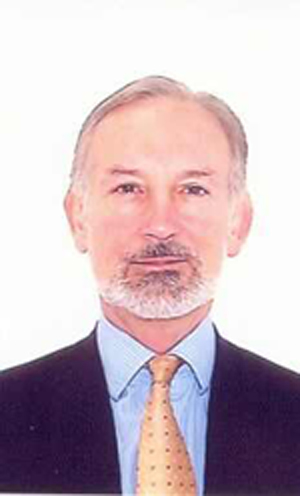 Gilbert Doctorow
Gilbert DoctorowResearch Fellow, American University in Moscow, based in Brussels
Commentators on the Freedom House event of March 4th "New Approach or Business as Usual? US-EU-Russia Relations After Putin’s Crackdown” have noted the participation on the dais of Guy Verhofstadt, Member of the European Parliament, leader of its Liberal bloc (ALDE) and former Prime Minister of Belgium (1999-2008), properly identifying him as the highest ranking politician in the room.
However, so far no one has explained why Verhofstadt was there and what his politics generally are. Hence there has been little attention to the puzzling contradictions both in Verhofstadt’s conduct and in the welcome he is receiving in America’s freedom-fighting, virulently Russophobe Neocon circles. In this brief essay I will direct attention to these important issues.
While the stress has been on Freedom House, the event's hosts, it also bears mention that a key co-organizer was the Foreign Policy Initiative (FPI), a think tank created by William Kristol and Robert Kagan as successor to the Project for the New American Century, a Neocon incubator which they co-founded in 1997. PNAC had become weighed down by its responsibility for America’s 2003 invasion of Iraq that turned out so badly. Founded in 2009, FPI established a platform for Robert Kagan to re-enter the US domestic political fray on a full-time basis now that he's relocated to Washington from Brussels, in line with wife's diplomatic career, Victoria Nuland.
Throughout his own career, Robert Kagan has been consistent in his anti-Russian positions which go back to the very origins of Neocon thinking in the late 1970s-early 80s. In 2004, he was co-author, with William Kristol, of an open letter condemning Vladimir Putin for the rollback of political freedoms and an imperial foreign policy which attracted signatures from leading American politicians of both parties, including Joe Biden and Michael McFaul. His 2008 book The Return of History, which was effectively a policy paper for the John McCain presidential campaign to which he was chief foreign policy adviser, singled Russia out as a revisionist state following an autocratic path.
However, for the purposes of appreciating the contradictions in his warm hospitality to Guy Verhofstadt today, we have to look at Kagan’s highly visible cheerleading for George Bush Jr.’s invasion of Iraq. His best-selling book Paradise & Power: America and Europe in the New World Order highlighted the differences in war-making potential and mindsets between the robust and leadership-capable America and effete, introspective Europe in a cogent if dishonest attempt to explain the Old Continent's opposition to America’s wars.
It was precisely Guy Verhofstadt, together with Jacques Chirac and Gerhard Schroder, who led the charge against armed intervention in Iraq in the months leading up to the American assault. As head of the smallest country among the naysayers, Verhofstadt paid the greatest price for his revolt against American hegemony. With the British acting as America’s proxy, he was subsequently denied election as President of the European Council, his hoped-for next big thing after leaving Belgian domestic politics.
What are Verhofstadt’s political views? Within Belgium, he was the founder of the Open VLD party based on the advocacy of free-market principles. Normally that would place him in the ideological orbit of the Neocons, putting aside preferences in the international domain. In the time since leaving domestic politics, Verhofstadt acknowledged his recovery from the grievous mistake of his ‘baby Thatcherism’ period, though the pan-European Liberal party movement has remained his field of play. At the same time, his closest ally in arms within the European Parliament is none other than Daniel Cohn-Bendit, leader of the Greens bloc, with whom he has co-authored a recently published Manifesto calling for revolutionary change to the European experiment: namely the creation of a federal union, otherwise comparable to a United States of Europe. Here potential contradictions with American Neocon foreign policy objectives are easy to see.
While he was PM in Belgium, Verhofstadt cut a figure as one of Europe’s most intellectual statesmen. It was he who publicly identified the ‘democracy deficit’ in his country which resulted in voter apathy and cynicism. However, he was utterly unable to repair the breakdown in solidarity between the Flemish north and the French-speaking south which is today tearing the kingdom apart.
Having failed to further democracy in his own country, Verhofstadt has made his name in the European Parliament as a freedom-crusader in other parts of the world, most notably in Russia, where, with some guidance from his Russia-baiting political allies in Estonia, he has made common cause with Boris Nemtsov and Mikhail Kasyanov, leaders of the PARNAS group.
On 24 October 2011, Verhofstadt and Kasyanov co-authored an op-ed article in the New York Times entitled "Time to Lean on Russia” in which they denounced as a ‘charade’ the Duma elections scheduled for December due to the denial of official registration for certain opposition parties. They went on to attack the proposed swap of posts between President Dmitri Medvedev and Prime Minister Putin after the presidential election in 2012. Kasyanov and Verhofstadt’s conclusion was that "Russia is not a democracy, but an increasingly fragile state run by an authoritarian regime that aims to bully, not only its own citizens, but also the rest of the world.”
I will not dispute here the disproportion between the allegations over propriety of party registration and the dangerous world role laid at the door of Putin’s Russia. For our purposes, it is sufficient to note that on November 9th, the International Herald Tribune published a response to Verhofstadt by none other than the doyen of Russia’s liberals, Grigory Yavlinsky, chairman of the Yabloko party, also a member of ALDE, who fully intended to lead his party into the Duma elections and rightfully resented any aspersions on their legitimacy. In "Time to Think, and Not to Lean on Russia,” Yavlinsky said that "Russia’s elections ceased being free and fair after the presidential elections of 1996” [four years before Putin’s accession to power] yet "back then European liberals did not protest as loudly as they are doing now.” Per Yabloko, rejection of opportunities for peaceful change, such as were implicit in the attempt by Verhofstadt to discredit the elections, were "irresponsible’ and lead to a dead-end.
Yavlinsky concluded that: "It would be a grave error to attempt to ‘lean on Russia’ without taking into account the current mood in Russian society and arrogantly disregarding the opinion of millions of Russian voters.”
However, Verhofstadt was not to be thrown off course so easily. Following the street demonstrations in Moscow in December 2011 protesting over alleged fraud in the Duma voting, Verhofstadt led an effort in the European Parliament to demand a re-vote in Russia, knowing full well that this could destabilise the government and lead to an open power struggle with an unpredictable outcome given the total disorganisation of opposition forces. Moreover, on 5 March 2012 he paid a visit to Moscow, together with his Estonian adviser and colleague, Kristiina Ojuland from the Reform Party, who also joined him on the dais at the Freedom House event one year later. The purpose of that visit was ostensibly to take a reading of the political mood on the ground and to meet with fellow liberals from PARNAS and Yabloko.
The statement issued by Verhofstadt on 5 March 2012 and published under the title "No business as usual with Putin’s Russia” did not mince words: "We have today witnessed the last nail in the coffin of Russian democracy. It is now time for the European Union and the United States to reflect long and hard on how to deal with Putin’s Russia. Three can be no business as usual”
From this public position to Verhofstadt's appearance in Washington, D.C. at the Freedom House event was just a very small step.
What remains unclear is the basis for today’s active cooperation between American Neocons and Guy Verhofstadt with his liberal bloc in the European Parliament. Has Verhofstadt become the latest American stooge at the center of European politics in the pattern of Carl Bildt of Sweden? Is he playing a double game, hoping to get American backing for his proposed revolution creating a federal Europe that would, in the end, bite the back-side of his American handlers? Time will tell.



_jpg/250px-ElbeDay1945_(NARA_ww2-121).jpg)
